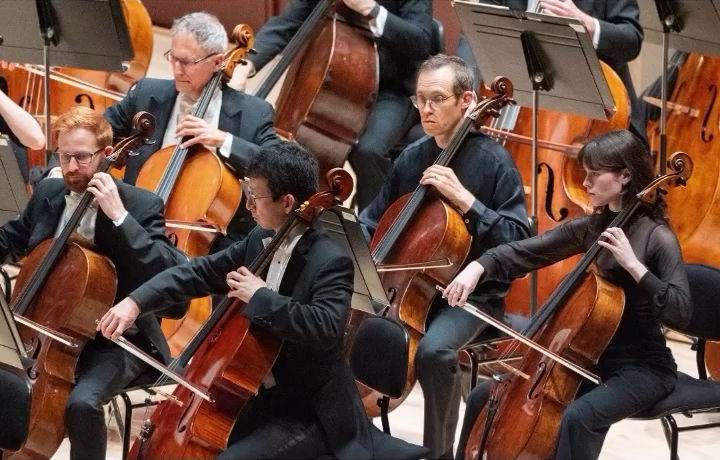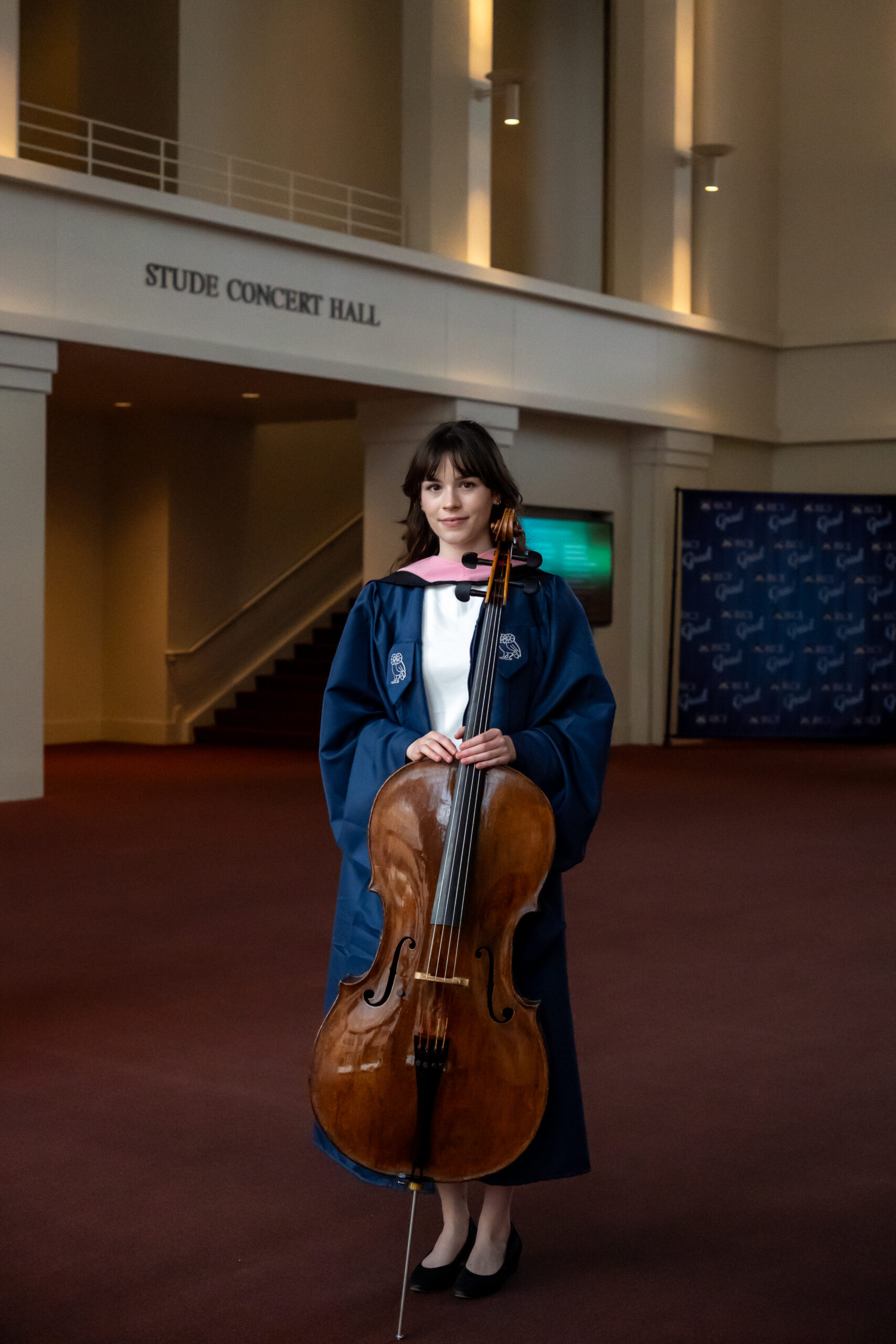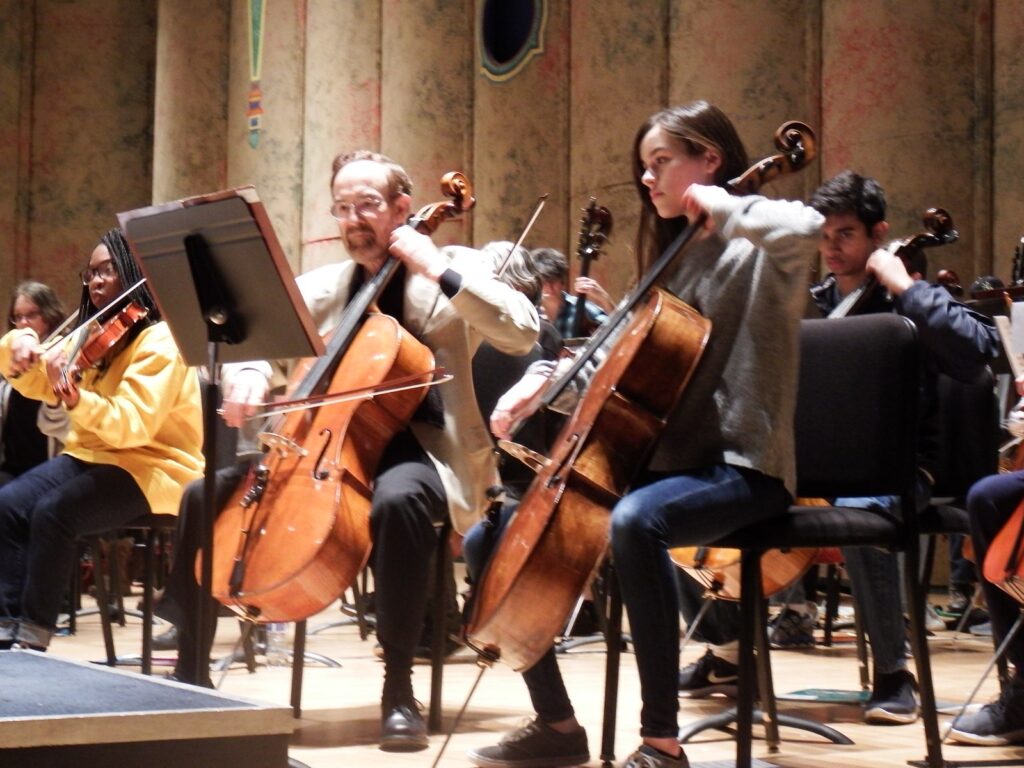Cellist Emma Cary, a Glen Allen native and daughter of two Richmond Symphony musicians, recently won a position with the North Carolina Symphony’s cello section. Her career has taken her across the country, earning degrees in Michigan and Texas, placing in chamber music competitions, and performing at summer festivals in California and North Carolina—but before making her name in one of North Carolina’s preeminent classical music organizations, she was a dedicated member of all four string and full orchestras in the Richmond Symphony Youth Orchestra Program.

Emma’s first steps into classical music started before she could even read music. Her parents Neal and Catherine Cary, who have each played with the Richmond Symphony for over thirty years, raised Emma in the concert hall. During the week, she listened as they taught lessons on violin and cello; on the weekends she sat in the Carpenter Theatre and watched them perform. At age five, she started taking lessons with her mother on violin, but within a few months, she switched and began to study cello.
“I remember one moment hearing my dad demonstrate in a lesson The Swan by Saint-Saëns, which made me really fall in love with the sound of the instrument,” Emma said. “My parents thought it might be better to start on a smaller instrument and started me on violin, but I still wanted to play cello and finally switched after a few months.”
At age eight, Emma joined String Sinfonietta, the beginning-level string ensemble in the Youth Orchestra Program. Over the years, she progressed through each ensemble, eventually joining the Richmond Symphony Youth Orchestra at age twelve. As a member of RSYO, she won their annual Concerto Competition, participated in All-Virginia Orchestra, and attended the former Eastern Music Festival in Greensboro, North Carolina.
Following her graduation from Glen Allen High School in 2019, Emma attended the University of Michigan School of Music, Theatre & Dance, where she studied with Professor Emeritus of Music Richard Aaron. While completing her master’s degree, she studied with Desmond Hoebig at Rice University, who retired earlier this year after teaching for 30+ years at the Shepherd School of Music.
Both teachers have had an immeasurable impact on Emma’s performance career.
“Mr. Aaron helped me organize my technique and my practice, and helped me figure out my path in music. He encouraged me to start taking orchestra auditions and taught me how to prepare my excerpts,” Emma said. “Mr. Hoebig helped me refine my playing through his example and high artistic standards, which constantly challenged me to grow.”

During her collegiate career, Emma began to narrow down which aspect of cello performance she wanted to focus on. There were three possible paths: solo, chamber, and orchestral performance. Emma had experience in all three routes—having performed as soloist with the Richmond Symphony and RSYO while in high school, and having placed with her violin/cello/piano trio in UMich’s Briggs Chamber Music Competition in 2023—but orchestral playing is where she truly shines, describing it as “the most natural” for her.
“I love the sense of shared purpose and collaboration in a large ensemble,” Emma said. “It feels like the most comfortable and fulfilling environment for me to make music in.”
Emma began the process of auditioning for orchestra positions while still in graduate school. This is the case for many auditioning musicians, who fly to various cities on the weekend to take auditions with symphonies across the country, returning just in time for their next class on Monday morning. This particular North Carolina Symphony cello section took place in mid-March 2025, during the final semester of Emma’s graduate degree, and spanned three days, including a preliminary, semi-final, and finalist round.
Orchestral auditions primarily involve performing excerpts from symphonic repertoire. Emma’s audition for the North Carolina Symphony included a list of excerpts from thirteen different major orchestral works, including Beethoven’s Symphony No. 5, Mozart’s Symphony No. 35, and Strauss’s Don Juan and Don Quixote. Auditioning cellists were also asked to perform the exposition of one of three major cello concertos.
Though Emma was already largely familiar with the required excerpts from previous study and experiences at other auditions, she still dedicated a month to practicing them before the audition itself.
“I’ve found that starting out by focusing on just a few excerpts each day, and gradually adding more until I’m running the entire list every day for at least a week leading up to the audition helps me feel truly prepared,” Emma said. “Playing through the list for other people is so helpful for nerves and getting a feel for what the actual audition will be like. In my opinion, there is nothing more effective than slow practice with a metronome—it’s what sets you up to feel consistent and secure in the audition.”
Emma’s dedication and hard work paid off, and following her audition in March 2025 she was officially offered a section cello position with the North Carolina Symphony. After a summer spent as a Fellow on full scholarship at the Music Academy of the West in Santa Barbara, California, she moved to Raleigh to begin her first season with the North Carolina Symphony.
One highlight of the North Carolina Symphony’s 2025–26 season has been their recent side-by-side rehearsal with Raleigh’s local youth orchestra program, Triangle Youth Music. This year, they played Dvořák’s New World Symphony, led by Music Director Carlos Miguel Prieto. Emma sat with two cellists from the Triangle Youth Philharmonic—Triangle Youth Music’s equivalent to RSYO—and described the rehearsal as a “full-circle moment,” thinking back to her time in the Richmond Symphony Youth Orchestra Program.
“It was really exciting for everyone to see more of what it’s like to play in a professional orchestra,” Emma said about side-by-sides in high school with the Richmond Symphony. “I remember how exciting it was to be surrounded by such a rich and powerful orchestral sound.”

A career in classical music is never easy, but for Emma, the countless hours of practice and performance have been infinitely rewarding. She advises current Youth Orchestra students aspiring for a career in classical music to dedicate consistent time and practice to perfecting their craft.
“Even though I come from a very fortunate position, having parents who are professional musicians in the Richmond Symphony and who supported my education, I truly believe anyone can pursue this path if they’re passionate about it,” Emma said. “I had a lot of guidance and opportunities early on, but ultimately I think the most important growth I’ve experienced has come from the work I put in myself.
“If it is something you truly love, it is absolutely worth it. It is a challenging path that takes determination and a lot of self-motivation, but I think real progress comes from the consistent effort you put in. Even with all the help I’ve had, no one can really do the work for you, and that is part of what makes this path so rewarding.”
Our monthly Spotlight Series is written by Anna Mitchell, Education & Social Media Coordinator. For inquiries, contact education@richmondsymphony.com.







